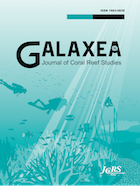Soundscape monitoring can provide valuable information on habitat quality and biodiversity of soniferous organisms in a coral reef ecosystem. However, the impacts of acute natural perturbations such as typhoons on coral reef soundscapes are poorly understood. Thus, we aimed to elucidate whether coral reef soundscapes reflect the degradation caused by Typhoon 6 (Khanun). Coral reef soundscapes were recorded by HydroMoths and quantified using the Acoustic Complexity Index (ACI) at three sites (Chinazaki, Kakinouchi and Sunabe) in Okinawa Island, Japan. In these sites, ecological data, including hard coral cover, fish species richness and abundance were obtained by visual-based surveys. We found a drastic decline in all frequency bandwidths of ACI analyzed (0.5-1 kHz, 1-2 kHz and 2-7 kHz), hard coral cover and fish species richness in Kakinouchi following the severe typhoon damage. Meanwhile, these values remained relatively constant at the other two, less impacted sites. This indicates that ACI can reliably reveal the acute impacts of typhoons on potential reef degradation. This study is the first of its kind to investigate the typhoon impacts on coral reef soundscape utilizing HydroMoths. We suggest that the simultaneous utilization of multiple HydroMoths could be a cost-effective PAM method for assessing coral reef ecological parameters across spatiotemporal scales.
抄録全体を表示
